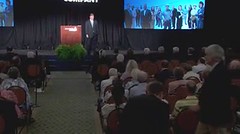SO has done a lot about energy efficiency, but can it do more, and how will it profit by doing so? Prof. Dan Everett asked this at the 22 May 2013 Southern Company Stockholder Meeting.
I have Mr. Dan Everett from Athens, Georgia, and he holds 11 shares of Southern Company.
TF: Talked to Dan earlier today. Dan is a professor at the University of Georgia, right?
DE: Right.
 He’s
Daniel M. Everett,
Assistant Professor of Computer Science, UGA Athens.
The SO Annual Stockholders Meeting apparently doesn’t get many professors.
He’s
Daniel M. Everett,
Assistant Professor of Computer Science, UGA Athens.
The SO Annual Stockholders Meeting apparently doesn’t get many professors.
TF: Fantastic. Well, welcome.
DE: Oh, thank you very much. And as a guy who has some professional interest in this stuff, I totally applaud the research that y’all are doing on energy technologies and renewable energies and efficiency technologies because it does take a while to deploy those.
My specific question is about energy conservation. I’ve noticed the company has invested about $10 million last year on conservation — which is fairly modest compared to the other investments that you’re making — but those investments have not only been environmentally beneficial, they’ve been productive; they’ve had a really high rate of return on those efficiency investments.
So my question is about the business model. Technically, there’s a lot more energy conservation that you could do that would pay off handsomely, but does the company has a business model that allows it to make money by actually selling less energy?
TF: Yeah. Thank you for that. It’s a very interesting concept he raised and it’s under discussion in a lot of other parts of the United States. So here’s an interesting point. The United States as a whole has a challenged economy and GDP growth is really pretty low and one of the things that I’ve been promoting at a national level is a national energy security plan where we’ve been promoting for so long an idea of scarcity behind energy. When you consider the blessing of resources that the United States has, my sense is by the end of this decade we could be a net energy exporter.
By “the blessings of resources” he meant nukes, coal, and natural gas, as he had just spelled out earlier in the same meeting.
Energy security for the first time in our history. And in fact, perhaps by 2030 we can be the biggest producer of energy in the world.
Indeed we can, and much faster by the solar and wind path he doesn’t want to discuss.
That changes the game, I think, and how we think about our own advantages in growing the economy. I don’t accept the fact that we have a new normal with unacceptably high unemployment and low economic growth. And I think the energy complex and we as leaders of the electricity side can really help change the game.
Such leadership would be a refreshing change.
Now let me hit one other thing that’s central to your question and then I’ll get directly to answer your question. These are two background comments. So one of the things is, we’ve got to grow the economy. Energy is going to be central to that. Look at the profile of the families we serve in the Southeast. This is exceedingly important to get. Fortyeight percent of the families we serve make less than $40,000 a year; they have relatively inflexible appetites for energy. They want the lights to come on, they want to be cool in the summers, they want to be warm in the winters. When you consider their ability to migrate and improve their economic reality to live in a better place, to eat better, to educate their kids better, to get better medical care — all of that will require more energy, and that is a good thing.
Good or bad, it just ain’t necessarily so. A smart phone does what a dozen different devices used to, and draws far less power. Automobiles are getting more efficient; so are air conditioners, refrigerators, etc. With solar panels on the roof, those air conditioners can be powered directly from the sun that’s heating the house. And solar hot water heating in the winter is not rocket science. Both solar PV and solar hot water generated at the same location they’re used are more efficient because there’s no long-distance line loss.
When I think about, now directly, energy efficiency, I am all over energy efficiency. And let me — and I’ll give you some statistics here in just a second, but this company has a great track record we haven’t talked about a lot until about last year we really started talking about it. Energy efficiency to me translates to my customers, the ability to use our product more wisely. When you think of that electricity productivity in the United States it has improved as a percent of GDP 150 percent over the last 20 years. So
we’re getting better. As we increase the economic perspective of the families we serve, they will likely consume more energy. As our economy grows at a healthier rate, it will likely consume more energy. So energy efficiency to me doesn’t mean use less; it does mean use it more wisely. And therefore, using the same kind of permanent-income hypothesis, using the same kind of consumption rate or an improved consumption rate, they can actually use more energy to make their life better. I think that’s a great thing.
 Yet
a 2010 study by Georgia Tech and Duke University
demonstrates that Georgia could easily use efficiency and conservation
to remove all need for new electricity production.
Specifically, 3,000 MW by 2020 (enough so we don’t need the new nukes
at Plant Vogtle) and 5,000 MW by 2030 (enough to shut down 3 of the
four Coal Plant Scherer units).
Yet
a 2010 study by Georgia Tech and Duke University
demonstrates that Georgia could easily use efficiency and conservation
to remove all need for new electricity production.
Specifically, 3,000 MW by 2020 (enough so we don’t need the new nukes
at Plant Vogtle) and 5,000 MW by 2030 (enough to shut down 3 of the
four Coal Plant Scherer units).
Track record of the Southern Company and our subsidiary companies on energy efficiency. There are kind of two
ways to think about it. One is capacity avoidance — how many new plants have we avoided building because we’ve been good stewards of energy efficiency. And energy efficiency, a lot of people translate as, you know, convert your light bulbs to CFLs and a variety of other things. I want you to broaden your horizon on what energy efficiency means. Energy efficiency really goes the whole gamut of make, move and sell electricity, and consume electricity. So it’s everything.
Don’t underestimate Tom Fanning by his constant repetition of his standard talking points. He’s a smart cookie who does understand the issues. What he wants to do, what he’s willing to do, and what he can persuade SO investors and board to do are different questions. For example, solar and wind because they have no fuel are in a very real sense more efficient than any fossil fuel or nuclear plant. He knows that, even if he goes on to talk about thermal generation (i.e., nukes, coal, and natural gas).
For example, when you make electricity, you want to have the most efficient heat rates. That’s the rate at which you convert a fuel stock into an electron. If you’re more efficient, there you’re actually practicing great energy efficiency and saving the environment and doing lots of good things.
Southern Company over the last 20 years or so has avoided about 4,000 megawatts of capacity, and that’s about the amount of capacity required to support a million homes. We serve about 4.5 million customers in the Southeast. That’s a big deal. From an energy standpoint — so these are the kilowatt-hours you actually consume.
Since 2010, Southern Company has avoided something like 1.6 billion kilowatt hours through our investments in energy efficiency. That’s about the amount of energy required to run the city of Birmingham and Savannah for a year. So we are doing a lot.
We have committed over $1 billion since 2010 through 2020 to reduce further our capacity needs via energy efficiency programs. We have, I think, the ability, we think, between now and 2020 to avoid another 800 megawatts.
So we’re doing a lot and I think the presentation that Chris Hobson gave you that talks about generation, transmission and end uses is a way that we can show leadership. Thanks very much.
Yeah, wait, wait. I didn’t answer that. One more — you wanted to associate profit making with energy efficiency. To us, growing the economy is how we’re going to make profit. So what I want to do is raise the financial reality of the customers we serve to create a more vibrant economy. And in fact, we’re seeing manufacturing — I mentioned before we’re growing manufacturing employment at double the national rate. That’s because of the blessings of cheap, plentiful, reliable energy. And we’re growing personal incomes and making American lives better. That’s the kind of role we play and that’s what we’ll do.
SO and Georgia Power on energy efficiency:
-
Southern Company Earth Cents
Introduced in 2008, EarthCents energy efficiency programs help our customers save energy and money while reducing greenhouse gases. EarthCents comprises a set of standing and new programs—and educational efforts—to reduce residential and commercial electricity consumption.
- Georgia Power Learning Power
- Georgia Power – Energy Efficiency Home Improvement Rebates –DSIRE
- Georgia Power – Commercial Energy Efficiency Program –DSIRE
 However, beware that SO and Georgia Power use
a very restrictive definition of energy efficiency.
However, beware that SO and Georgia Power use
a very restrictive definition of energy efficiency.
Update: Forgot the boilerplate.
Thanks to Southern Company for putting up a
transcript which,
while like all transcripts isn’t always 100% accurate
(I’ve made some corrections in punctuation and added paragraph breaks),
makes blogging a lot easier.
SO’s video is still in opaque brightcove format that,
unlike YouTube or Vimeo, doesn’t permit linking to specific times,
so you’ll have to manually scan to
1 hour, 9 minutes, and 18 seconds
see Dan Everett speak.
All stills here are from SO’s video, taken by me as fair use.
-jsq
Short Link:
Pingback: It is not enough to add a little solar and wind on top of fossil and fission fuels –a German @ GA PSC 2013-06-18 | On the LAKE front
Pingback: SO’s plan to make the Southeast a net exporter of the energy from solar and wind? –John S. Quarterman @ SO 2013-05-22 | On the LAKE front